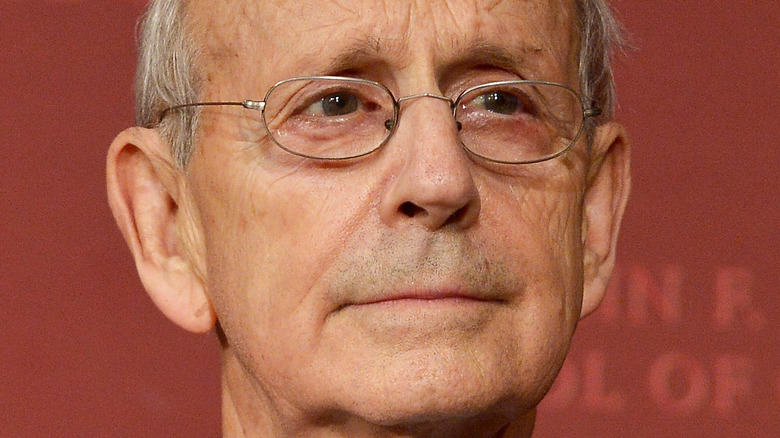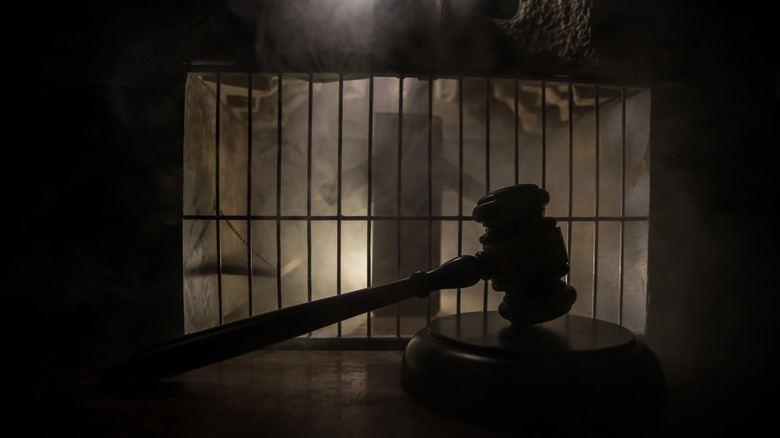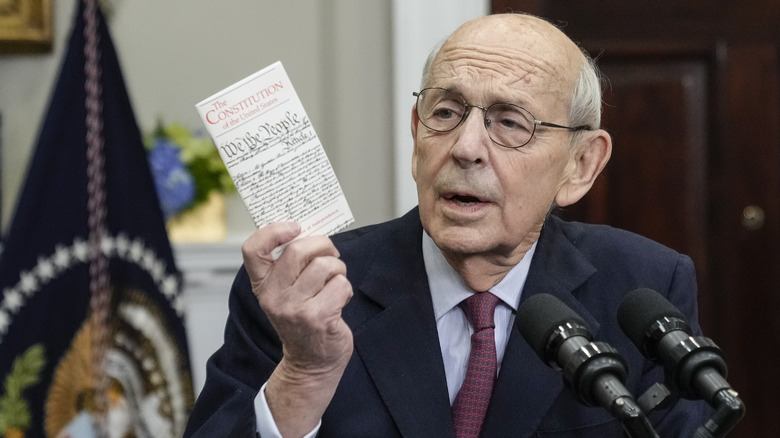Justice Breyer Raised A Troubling Question During His Time On The Supreme Court
Everyday life is full of personal decisions with rather limited effects, usually restricted to oneself and an immediate circle of loved ones. The choice of whether to have cereal or eggs for breakfast? Not too momentous. But the choice about where a young person ought to go to college? That's quite a bit bigger of a decision and will impact not only the college-goer for life but the lives of plenty of others, in turn. And how about an absolutely, fundamentally life-altering choice like, say, whether or not to carry a fetus to term? Few choices, if any, could be more difficult or impactful in every way.
So how about those very, very few people — nine Supreme Court Justices, in fact — who make decisions that dramatically affect the fundamental lives, rights, and choices of a full 330 million Americans? Exactly how impeccable, how superlative, and how, shall we say, judicious, must their decision-making processes be? It doesn't affect rural Idaho at all if Justice Stephen Breyer eats cereal for breakfast. But it certainly does matter what he concludes about Roe v. Wade. And he, for the record, supported it (via NBC Chicago).
Justice Breyer, who has served as Supreme Court Justice since 1994 and is set to retire on June 30, 2022, has been described as a "pragmatist," "problem-solver," and "centrist," as The Washington Post says. He's also been a staunch support of abortion rights, environmental care, and health-care coverage. One issue that's plagued him, though? The death penalty.
Cruel and unusual punishment
During his tenure in the Supreme Court, Justice Stephen Breyer has gained respect from people of all political bends, which is a staggering rarity nowadays (via The Washington Post). He hasn't done so by taking a milquetoast attitude toward law, either. Ballotpedia, which provides an assiduous record of Supreme Court rulings, found that Justice Breyer dissented in 7 out of 41 cases with a vote of 8-1 from 1994 to the present. That means that 17% of the time, even if he was the only one to come to a conclusion, he stood his ground and was not swayed.
Such a record and reputation ought to make us stand up and take notice if Breyer displays uncertainties about the death penalty. Capital punishment has been with the United States since its earliest days and has gone back literally thousands of years through human history as a punishment for society's most heinous crimes (per Law Shelf). Cornell Law School describes that each U.S. state, as well as the federal government, has the right to impose capital punishment. The death penalty also underwent some reforms in the 1970s to make it fairer because the Supreme Court declared that its inconsistent application constituted "cruel and unusual punishment." This is forbidden by the U.S. Constitution's Eighth Amendment.
Even so, CNN reports that Justice Breyer believes that the death penalty might be unconstitutional, and he's afraid that innocent people have been executed.
Rethinking the fairness of capital punishment
Justice Stephen Breyer has worked extensively in both academia, teaching law at Harvard, and in practical legal environments. He tends to see Supreme Court decisions in terms of their effects on everyday life and people (via The Washington Post), including death penalty laws.
CNN, for instance, states that Breyer has had humanitarian misgivings about the length of time inmates have to wait on death row before being executed. It's true that more and more, death row inmates have had to wait for a ridiculously long amount of time with nothing else to do but ponder their impending deaths. As the Death Penalty Information Center says, most death row inmates spend more than a decade waiting for death, and more than half have waited for over 18 years. In some cases, inmates are hoping for their sentences to be ameliorated. Over half of those individuals — people who were slated for execution and then exonerated — waited for over 23 years. NPR reports that some people have waited up to 40 years, which is blatantly absurd. It's no wonder that Justice Breyer posited that the Supreme Court reform practices regarding capital punishment.
Perhaps even more pertinently, Breyer reviewed numerous death penalty rulings and came to conclude that some people may have been wrongfully executed. One particular 2015 lethal injection got him thinking about the topic. He might be leaving the Supreme Court on June 30, but there's no reason the issue has to leave with him.


